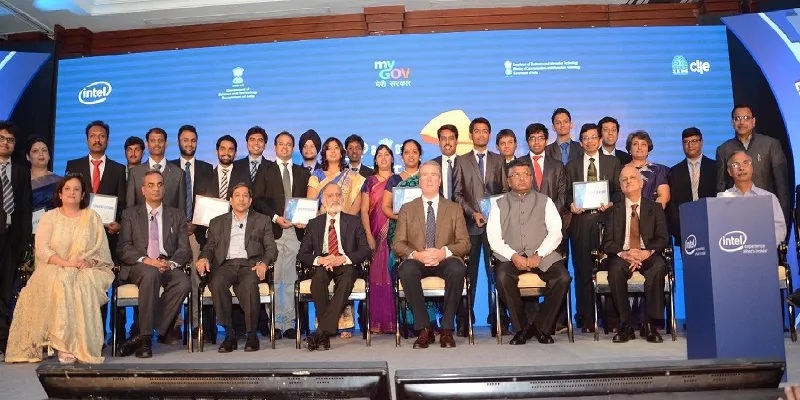Intel's Ek Kadam Unnati Ki Aur to empower non-urban citizens through technology
This article is sponsored by Intel.
The growth in internet penetration in rural areas has the potential to bring a change in the way Indians learn, work, and use the Internet in their daily life. A report by The Boston Consulting Group (BCG) and the Internet and Mobile Association of India (IAMAI), titled [email protected], says that by 2018, the population accessing the internet in India will be more rural, more mobile, and will do so in their own language.
However, this shift is largely dependent on how the government and industry can come together to tap this potential. And that is where initiatives driven by organizations like Intel play a key role. Fostering innovation in India is not a new area for Intel. In fact, it has been doing so for the last two decades. In 2015 alone, Intel has launched several such initiatives, including the DST Innovate for Digital India Challenge, which focused on innovations in delivering e-governance services through mobile platforms.
Fostering innovation in rural India
In Nadimpalle village in Telangana, an Unnati Kendra, a development centre, has made 800 villagers digitally literate. The initiative, led by Intel, aims to create a framework for the Telangana ‘model digital village’. Besides offering a number of citizen services under the Telangana government's e-panchayat programme, the first-of-its-kind centre is providing relevant local content.
This is part of Intel’s Ek Kadam Unnati Ki Aur (EKUKA) initiative, where the company is partnering with government entities to create the roadmap for the digitisation of rural India and thereby enabling innovation at the grassroots. As part of the initiative, Intel will launch Unnati Kendras in 10 states to provide citizen services under the respective state government’s e-panchayat programme. Intel will also leverage Common Services Centres (CSCs) and MyGov to set up Digital India Unnati Kendras.
Speaking at the launch of EKUKA in late November, Shri Ravi Shankar Prasad, Minister of Communications and IT, said, “We strongly believe that grassroots-level innovation built through public-private partnerships (PPP) like Ek Kadam Unnati Ki Aur. Such initiatives are the need of the hour to empower citizens, facilitate digital infrastructure as a utility and provide governance as well as services on demand.” The minister cited the work of Imran Khan, who built several education-focused apps, is a role model for youth in smaller cities and towns. Prime Minister Narendra Modi had famously said on his visit to the UK that his India resided in people like Imran.
Kiran Karnik, former NASSCOM president, who was also part of the EKUKA launch event, remarked that there can’t be a truly digital India without innovation.
R Chandrashekhar, President, NASSCOM, added that there was an urgent need to steer investment in the right direction to help India’s innovators: “We need innovations that have the ability to impact a major chunk of our population at the grassroots.”
Debjani Ghosh, Senior Vice-President and General Manager for Intel’s Sales and Marketing Group and Managing Director of Intel South East Asia, said, “Intel is committed to supporting the Digital India vision, and we believe this vision can be realized with strong collaboration between the government and the technology ecosystem. With Ek Kadam Unnati Ki Aur, we will make technology mainstream in rural areas in collaboration with the government.” Debjani also spoke about the milestones Intel had achieved with regard to Digital India and added that Intel would continue to innovate and introduce initiatives to support the government’s vision.
Gregory R. Pearson, Senior Vice President and General Manager for sales and marketing group of Intel, added, “A strong collaboration between the government and the technology ecosystem will help to realize the vision of Digital India. And, with our Ek Kadam Unnati Ki Aur initiative, we are driving efforts to bring technology to rural India.”

At the event, Intel also felicitated the 10 teams that emerged as finalists of the Intel and DST Innovate for Digital India Challenge (IFDIC). The challenge was launched in April 2015, and as stated earlier, aimed to unearth talented young companies and entrepreneurs with the ability to develop intuitive solutions for the delivery of e-governance services through eKranti/MyGov apps on mobile platforms. The IFDIC attracted over 1,900 entries from across India.
The 10 winners come from a variety of sectors including agro tech, IoT, mobile, healthcare, and financial inclusion. Making it to the coveted list were four teams from Karnataka (AirPaper, Jayalaxmi Agrotech, AapnaSeva and Tjay), two from Tamil Nadu (Asha+ and Haqdarshak) and one each from Maharashtra (CerviScope), New Delhi (4 SL Box), Odisha (Aurassure) and Gujarat (Indian TTS).







